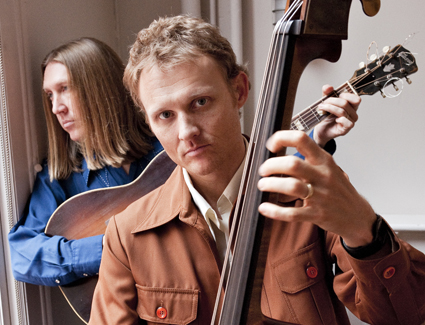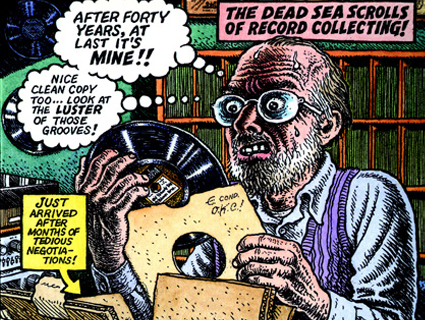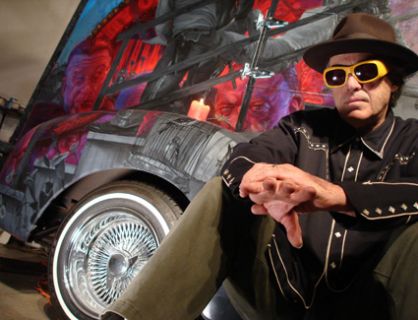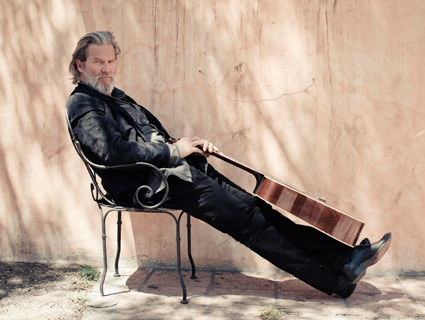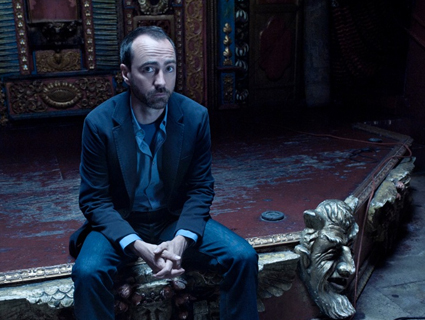
James MercerFrank Ockenfels
The Shins’ 2007 album Wincing the Night Away got rave reviews and debuted at number 2 on the Billboard 200, spawning a yearlong tour and snagging a Grammy nomination for Best Alternative Music Album. It was a wild ride for a band that had spent nearly a decade working its way up from obscurity in Albuquerque, and front man James Mercer came away from it exhausted and ready to quit. The last thing on his mind was the next Shins project. “It was a bit of a crisis in a way,” he says. “What do you do if you decide the band you’ve been with for the last 10 years, you just suddenly don’t want to do?” So Mercer took a breather in the form of Broken Bells, an excellent collaboration with Brian Burton (a.k.a. Danger Mouse), as a way to “open up my horizons.” A few years later, with a new label and rejiggered lineup, Mercer has decided to take a fresh crack at the Shins. The band’s new album, Port of Morrow, out next week, takes a smoothed-out, matured approach to the Shins’ characteristic electro-folk-rock. I spoke with Mercer about his favorite rock and roll singers, being raised a military brat, and why you can’t get a decent American-made microphone anymore—dammit!
Mother Jones: So after the Wincing tour, you were hitting some roadblocks with the Shins?
James Mercer: Mainly I was tired of being right in the middle and everything sort of revolving around me, including the friendship dynamics-slash-bandmate dynamics and the creative aspect. It was a bit much. It had never been so big, and I had never been someone who was ever in the center of any kind of social circle. And in the midst of that, Brian Burton kind of came up with the idea of us working on a new band where he was writing in a more traditional sense. It was kind of perfect timing. I was a bit intimidated by it, but I had also recently decided to start saying “Yes” to things.
MJ: Musically, or in your life in general?
JM: Life in general.
MJ: Correct me if I’m wrong, but it seems like the Shins don’t really have a permanent lineup anymore. Is that right?
JM: Yeah. I’ve always sort of felt like what the Shins is, I guess, is a vehicle for my writing. And that’s really about recording a lot, so I really try to concentrate on that. I mean, these new guys I have in the band are so cool, and they’re so good, that it’s possible I’ll be working with them until I die. I just want to keep it open. Now that I’ve sort of broken everything apart, I’m not really excited about the idea of committing to anything permanently.
MJ: Some bands get their groove on more when they form these deep bonds from being together so long. When you have a shifting lineup, how does that change the way you make music?
JM: I understand what you’re saying. You know, I’ve read the Keith Richards thing, and he really talks a lot about that, the sort of like subliminal communication that goes on between bandmates, and there certainly is that. I definitely have that with these new guys, you know, but there’s a lot of other things that go on that can complicate that sort of unconscious dynamic. While working with Broken Bells, I really enjoyed working with new people and just sort of the freshness of it, and I wanted to continue that feeling. I wanted to have those new conversations, musically and otherwise.
MJ: Sure, nobody wants to be stagnant.
JM: Yeah, I guess “stagnant” would definitely be a word for it, after the Wincing tour.
MJ: I want to go back to what you said about the band being a vehicle for your writing. That’s true, but at the same time, it’s not just the James Mercer Band with backing musicians. It’s collaborative. So where’s the balance?
JM: I think I’ve been pretty lucky, honestly, because I’ve never gone through an audition process or anything. In most of my decisions like that, I just kind of feel it out: You know, do I feel comfortable with this person? And do I like what they do? What I’ve kinda realized recently is that I come up with the big ideas, you know, on the records, like the songs, and maybe the overall aesthetic of a song, and the context behind the lyrics and stuff. Then I rely on my friends to make it cool. I do my best, and if I could do it alone, it would be a totally different thing. But I can’t. It is therefore a band—still.
MJ: There’s a line in “Simple Song” that seems to capture that: “I know that things can really get rough/when you go it alone.” Does that apply to you as a musician?
JM: It probably has something to do with that, yeah—the fact that I did have a fair amount of solo effort in this. But in the context of the song, I’m talking about people who are avoiding intimacy in relationships and stuff like that. I mean, honestly, humans are social creatures that really crave intimacy, and I think that the friends I have who are trying to somehow go it alone are suffering for it.
MJ: You spent part of your childhood in New Mexico. I’m also from the Southwest, so I’m wondering how living there influenced you as a person, and as a musician?
JM: My dad was a Navy munitions officer, and by the end of his career he was a specialist in nuclear weapons. We were living in England, and we moved to Albuquerque so he could be the head of the Interservice Nuclear Weapons School, which was a big Navy facility to teach people how to deal with nuclear weapons safety and, you know, accidents. Crazy stuff. But one of the things that’s great about a place like Albuquerque is that there wasn’t this huge music scene with all these established bands and an established aesthetic. And so I think it was easier for someone like me to kinda ease my way into performing and not have to compete with all these talented kids, you know?
MJ: How did growing up with a parent in the military inform your music and/or your politics?
JM: Right, well, I guess I had an understanding of the mentality behind conservatism. I at least have this sort of reference point; I know these people. Which is one thing that I think a lot of people, in a way, are ignorant of.
MJ: You mean liberals are ignorant of?
JM: Yes, and proudly so. I see it often behaviorally. But my dad and I get into it all the time. He loves to discuss politics much more than I do and we have pretty heated conversations often. But we both kind of agree that it hasn’t really been a good conversation unless you leave a little bit offended. So that’s the sort of relationship I have with my dad, and we love each other. But even as a teenager I was forced to contemplate the whole thing of what my dad did, you know, the mechanics behind what he did, and the reasoning for it. And now I have kids, and it’s made it even more bizarre, because it’s this scary, bad thing that you have to sort of hide from your children, the world of war and violence and all that stuff.
MJ: There’s a lot of German imagery in this album: a song called “40 Mark Strasse” and a line in “Port of Morrow,” for example, that references Cologne. What’s up with that?
JM: I had come up with the idea of using that as a theme for “40 Mark Strasse” before I started meeting with [producer] Greg [Kurstin]. But one of the reasons is Greg. He loves the German avant-garde pop of the ’70s. And so in our conversations about aesthetics and the theme for the record, we definitely talked about Faust and the produced things from the ’70s from Berlin. I guess there’s a bit of nostalgia. I love Germany; probably my fondest memories of childhood were in Germany. So I guess that’s the source.
MJ: Where did you live in Germany?
JM: We were in a town called Neidenbach, and then we moved to Ramstein Air Force Base.
MJ: What is 40 Mark Strasse? An address?
JM: No, actually 40 Mark Strasse was a phrase that the GIs used to refer to a stretch of highway that ran from Kaiserslautern to Ramstein, and it was where there were young prostitutes at night. So it was 40 marks to hook up with one of these young ladies. My dad was a nightclub singer at a country-and-western bar in Kaiserslautern, and we’d drive on this road and we’d go past these bus stations where there’d be these girls who looked like the age of a high school girl, some of them. And I didn’t understand what prostitution was. I mean, I knew it was some sort of vice thing, an adult thing, and I was obviously very curious about it as a 9- or 10-year-old. So it was kind of, I had this R&B song, you know, and that to me just seemed like a perfect theme for it.
MJ: How did you develop your singing style? And who are your vocal heroes?
JM: I really love Ian McCulloch from Echo and the Bunnymen. He was always a favorite of mine. And I still think he was probably one of the best rock and roll singers there’s ever been. It’s kinda the stuff I grew up listening to in high school in England. I kinda learned to sing singing to Echo and the Bunnymen songs and Smiths songs: Morrissey would be a big favorite. I can’t remember the guy, but there was a band called House of Love that was on Creation, and the guy who sang for them was a favorite as well.
MJ: You seem very comfortable singing in falsetto.
JM: More recently, yeah.
MJ: Was that a conscious decision? Because some male singers will do that all the time, and others never will.
JM: You know, it’s funny, I say I do it more recently, but one of the early things that really got popular for us was an entirely falsetto performance, a song called “Sphagnum Esplanade.” Working with Brian for Broken Bells was when I really sort of embraced it. It was effective, you know, it really worked. So much of working with Brian just made me more adventurous.
MJ: Yeah, because you have to get a little outside your comfort zone to sing like that.
JM: Definitely. You’re really kinda going for it. It’s real singy.
MJ: So another thing about the Shins is that I feel like your instrumental arrangements are highly layered. There are lots of themes happening on top of each other all the time. How does that come about?
JM: There is certainly a conscious effort to make the songs as interesting and engaging as possible. And on this record, Greg was a huge part of that. He often thinks about doing something contrary to what you’ve already established in the production. So something that counters the rhythm of the melody, he’ll put in some sort of percussion. Which is a great technique, I think that’s something I’ll really steal.
MJ: I wanted to ask you about the song “No Way Down,” which was one of my favorites. It seems like there’s a metaphor for consumerism, or money, or something.
JM: That song, I wrote the lyrics really quickly, which doesn’t usually happen. I was on the plane, and I read an article about the huge shift in America, how we’ve lost so many good, honest, working-class jobs. It was describing this history of the relationship between unions and the big businesses and how the free trade concept came into being and just totally altered our economy and hurt the people who made all the incredible American products that we used to have—all these damned microphones I buy on eBay, the vintage equipment I buy, all of this was made by these people. It’s incredible, you pretty much have to buy it from like 50 or 60 years ago, because you can’t get anything these days that’s as high-quality. And so not only did it undercut their livelihood, but it sort of changed what America was, sort of that pride in things that were American made. It really changed the way we and the world think about America.
MJ: Right. We don’t produce all that much anymore.
JM: There’s definitely an interest in the idea of things being made here in Oregon, and maybe even here in Portland, and people wanting to support that. Portland is in love with the idea of manufacturing jobs existing in the city and the state. If that concept were to spread, which I think it is, that could change things. It’d be great.
MJ: The line: “A tiny few catch all of the rays” got me thinking about Occupy and the income-inequality issue. Were you thinking about that at all?
JM: Well, I wrote this song before the Occupy thing happened, but it was certainly part of that. I was living in the same culture that the Occupy thing came out of. It’s the same concept.
MJ: Did you go to Occupy Portland at all?
JM: I didn’t. My extended family is very political and very polar with each other, and it’s put a bad taste in my mouth. All the rhetoric going back and forth and sort of hating on each other. So I’m not an extremely politically active person at this stage of my life.
MJ: Well, I can understand that if it’s had a negative impact on your family.
JM: Right, and certain personalities just work differently. One thing that I’ve struggled with has been a certain amount of animosity toward the whole human race. You know, if you’re starting there, politics kind of is beside the point.
MJ: Do you still feel that way now?
JM: I definitely feel less that way, but I have my bouts. It’s hard to give a shit when you feel disgusted by the whole experiment.
Click here for more music coverage from Mother Jones.

